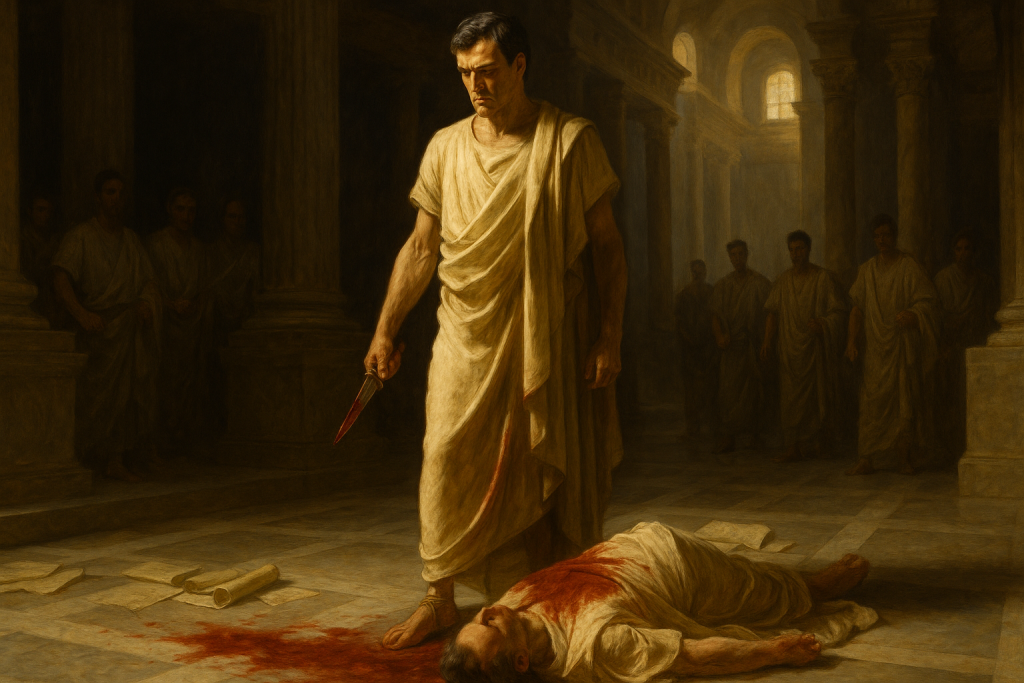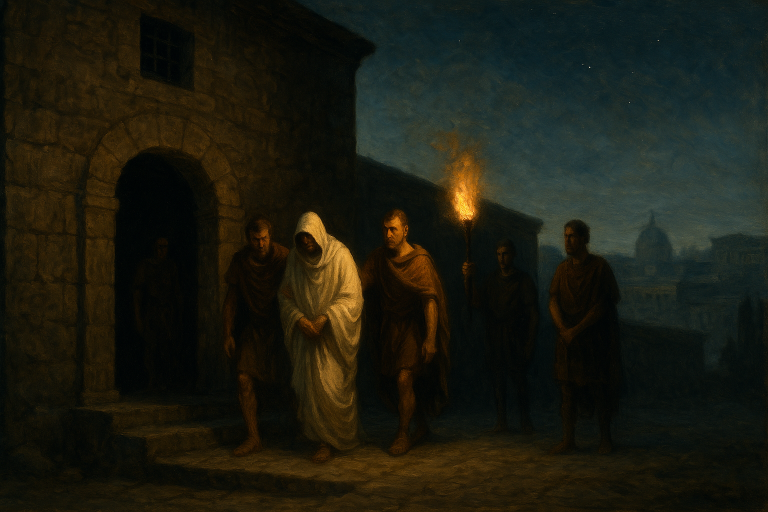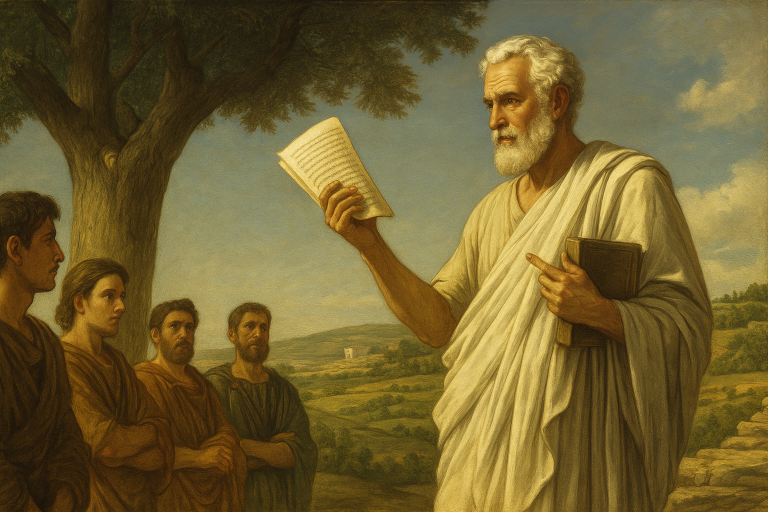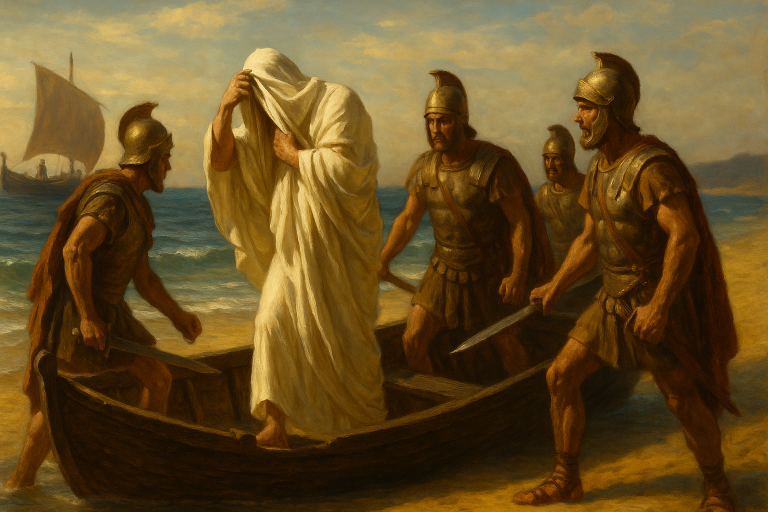Brutus the Tyrannicide · Philosopher Turned Assassin

Rome, March 15, 44 BCE
Marcus Junius Brutus walked to the Senate meeting with a dagger concealed beneath his toga. He was forty years old, a trained philosopher, a student of Stoic ethics and Academic skepticism. He had studied virtue in Athens, corresponded with Cicero about moral philosophy, written treatises on duty and reason. He was known as a serious man, principled, incorruptible, devoted to the ideals of the republic.
This morning, he was going to murder Julius Caesar.
The man he was about to kill had pardoned him after the civil war. Had promoted him to positions of power and trust. Had treated him almost as a son. Caesar might actually be his biological father, given his mother’s long affair with the dictator. Whether by blood or by patronage, Brutus owed Caesar everything.
But Brutus had convinced himself that philosophy overrode personal debt. That virtue demanded this. That the republic, the abstract ideal of shared government and constitutional rule, mattered more than loyalty, gratitude, or personal honor. He had studied under the best teachers. He had absorbed Stoic principles. He knew what duty required.
The Senate gathered in Pompey’s Theater. Caesar arrived, healthy and confident. The conspirators had gathered too, about sixty senators with daggers hidden under their togas. They surrounded Caesar with a fake petition. The signal was given. The knives came out.
Twenty-three wounds. Brutus struck too. Caesar, seeing Brutus among his killers, reportedly said, “Kai su, teknon?” And you, child? Or perhaps “Et tu, Brute?” as Shakespeare had it. Whether he actually spoke those words or not, they captured the essence of the betrayal. The man you trusted. The student of philosophy. The one who should have understood loyalty.
Caesar fell at the base of Pompey’s statue, blood pooling on the marble. The conspirators raised their daggers and declared liberty restored. Brutus tried to speak, to explain the philosophical justification, to make clear this was tyrannicide not murder.
But Rome didn’t care about philosophy. And within days, the philosopher would discover what his principles had actually accomplished.
The Stoic Education
Marcus Junius Brutus was born in 85 BCE into one of Rome’s most distinguished families. His mother was Servilia, one of the most powerful women in Rome and Julius Caesar’s longtime lover. His father was killed in the civil wars when Brutus was young, executed by Pompey during the conflict between Pompey and Lepidus. The boy grew up in a household shadowed by political violence and dominated by his mother’s relationship with Caesar.
But the weight Brutus carried wasn’t just personal. It was ancestral. His family claimed descent from Lucius Junius Brutus, the legendary founder of the republic who had expelled Rome’s last king five centuries earlier. That Brutus had killed his own sons when they conspired to restore the monarchy. That Brutus had put the republic above family, above personal loyalty, above everything. The story was foundational to Roman identity. And Marcus Junius Brutus grew up bearing that name, that expectation, that impossible standard.
He was sent to Athens to study philosophy, the traditional education for wealthy young Romans. But Brutus took it seriously in a way most didn’t. He studied under Stoic and Academic philosophers, absorbing their teachings on virtue, duty, reason, and the proper ordering of the soul and state. He read Plato’s Republic and Aristotle’s Politics. He learned that virtue was the only true good, that the wise man acted according to reason regardless of personal cost, that duty to the common good outweighed private interest.
He wasn’t just a dilettante. He wrote philosophical works. He corresponded with Cicero, the greatest Roman philosopher-statesman, debating fine points of ethics and epistemology. He applied Stoic principles to his political career, earning a reputation for honesty in administration and incorruptibility in office. When he governed provinces, he didn’t loot them the way most Roman governors did. He followed the law. He acted, as far as anyone could tell, according to principle.
His uncle by marriage, Cato the Younger, reinforced everything his philosophical training taught. Cato was the purest embodiment of Stoic republicanism Rome had ever produced. Brutus watched Cato oppose Caesar year after year, refusing every compromise, blocking every proposal that concentrated power in one man’s hands. He watched Cato fight Caesar’s rise with every legal and political tool available. And when Caesar finally won the civil war, Brutus watched Cato choose death over submission. At Utica in 46 BCE, Cato read Plato’s Phaedo and then killed himself rather than accept Caesar’s pardon. Death was preferable to life under tyranny. That was the lesson. That was the example burning in Brutus’s memory.
Brutus absorbed it all. The philosophy. The family history. Cato’s example. And he developed a worldview that saw politics in stark moral terms. Virtue versus corruption. Liberty versus tyranny. Republic versus monarchy. There were no gray areas, no room for compromise, no acknowledgment that reality might be more complex than principle. He was gentle in personal manner, scholarly and thoughtful, but absolutely rigid in his convictions. The philosopher’s weakness was already forming: mistaking moral clarity for understanding of reality.
The Impossible Position
When Caesar crossed the Rubicon in 49 BCE, Brutus faced an impossible choice. On one side was Caesar, his mother’s lover, his patron, the man who had advanced his career, possibly his biological father. On the other side was Pompey, his father’s killer, but now the Senate’s champion, the defender of constitutional government against military dictatorship.
Philosophy said support the republic. Personal loyalty said support Caesar. Brutus chose philosophy.
He joined Pompey’s forces and fought against Caesar in the civil war. At Pharsalus in 48 BCE, when Caesar’s outnumbered veterans crushed Pompey’s larger army, Brutus was on the losing side. Pompey fled and was murdered in Egypt. Brutus was captured.
He expected execution. Or at minimum, exile and ruin. Caesar’s clemency was well-known, but Brutus had actively fought against him. He had chosen Pompey, chosen the Senate, chosen to oppose everything Caesar represented. He had earned death by Roman standards.
Caesar pardoned him immediately. Not just pardoned him, but showed him extraordinary favor. He made Brutus governor of Cisalpine Gaul, one of the most important provinces. He promoted him to praetor. He consulted him on policy. He treated him with affection and trust, almost as a son. The clemency was complete. Brutus owed Caesar his life, his career, his wealth, his position. Everything.
In Roman society, this created a sacred bond. Patronage was the foundation of the political system. To betray a patron who had saved you and raised you was unthinkable. It violated every social norm, every expectation of honor and gratitude. The debt Brutus owed Caesar was absolute.
But Brutus convinced himself that philosophy overrode personal debt. That virtue mattered more than gratitude. That the republic, the abstract principle of constitutional government, outweighed personal honor. He had been taught that the wise man acts according to reason regardless of personal cost. Well, here was the cost. Caesar had saved him. But Caesar was also becoming a tyrant. And tyrants, philosophy said, must be opposed.
By 44 BCE, Caesar’s power was undeniable and uncheckable. He held the title dictator perpetuo, dictator for life. He controlled all military appointments. He appointed magistrates. He passed laws through a compliant Senate that barely bothered to debate anymore. Elections were held, but everyone knew the results were predetermined. Caesar refused a crown when offered publicly, but he held every power a king would have held. The forms of the republic remained. The reality was one-man rule.
To Brutus, this was tyranny. It didn’t matter that Caesar was generally benevolent. It didn’t matter that he used his power for reform, not persecution. It didn’t matter that the republic had been broken and dysfunctional for decades, that Caesar’s centralization had brought stability after generations of civil war. What mattered was the principle. One man rule was tyranny, period. The form mattered. The constitution mattered. Liberty, even theoretical liberty, mattered more than effective government.
The pressure on Brutus was enormous. Other senators approached him quietly. Your ancestor expelled the last king, they said. Are you really Brutus’s descendant? Or just bearing the name? Graffiti appeared around Rome. “Brutus, are you sleeping?” “You’re no true Brutus.” His brother-in-law Cassius, who had his own grudges against Caesar, recruited him carefully. The conspiracy needs your name, Cassius explained. Without you, it’s just ambitious men killing Caesar. With you, it’s philosophy in action, the republic being restored.
Brutus calculated. He was a philosopher. He could reason through this. Caesar was a tyrant. Killing tyrants was not only permissible but virtuous. His personal debt to Caesar was irrelevant compared to his duty to Rome. The republic was dying under one-man rule. Only Caesar’s death could restore liberty. The logic was clear. The conclusion was certain.
He joined the conspiracy. The philosopher would become an assassin. And he would do it, he told himself, for virtue.
The Conspiracy
Cassius was the operational leader, the man with grudges and ambition, but Brutus became the moral center. The conspiracy eventually included about sixty senators, a mix of motives. Some were ideological, true believers in republican government. Some had personal reasons to hate Caesar. Some were opportunists betting on the winning side. But Brutus’s presence gave it legitimacy. His reputation for philosophical principle, his family name, his known incorruptibility, all made the assassination look noble rather than merely murderous.
They debated the details carefully. Where to kill Caesar? His house was too private. The theater was too public. They settled on a Senate meeting on March 15, the Ides of March according to the Roman calendar. Caesar would be there, surrounded by senators, in a quasi-official setting. It would look less like murder and more like institutional action.
Should they kill Mark Antony too? Antony was Caesar’s closest ally, his co-consul, the man most likely to rally Caesar’s supporters and seek revenge. Cassius argued yes. Kill them both. Eliminate the threat completely.
Brutus said no. This was principle, not purge. They were killing Caesar because he was a tyrant. Antony was not a tyrant, just Caesar’s friend. To kill him would make them murderers, not tyrannicides. It would violate the philosophical justification for the entire act.
Cassius yielded to Brutus’s moral authority. They would spare Antony. It was a decision made on philosophical grounds, principle over practical politics. It would destroy them.
Brutus convinced himself completely of the righteousness of the act. This was tyrannicide, not murder. Caesar had become a tyrant by holding permanent dictatorial power. Killing tyrants was virtuous. Roman history celebrated Brutus’s ancestor for expelling the king. Greek philosophy praised Harmodius and Aristogeiton for killing the Athenian tyrant. This was the same. Principle demanded it. Virtue required it. The fact that Caesar had saved his life, promoted him, trusted him, possibly fathered him, all of that was irrelevant. Personal loyalty could not outweigh duty to the republic. The greater good trumped private obligation.
The morning of March 15 arrived. The conspirators gathered at Pompey’s Theater where the Senate was meeting. Caesar almost didn’t come. His wife Calpurnia had dreamed of his murder and begged him to stay home. Omens were reported. But the conspirators sent word that the Senate was waiting, and Caesar’s pride wouldn’t let him appear afraid. He came.
The conspirators surrounded him with a petition, a procedural trick to get close. At the signal, the daggers came out. Caesar fought back initially, but there were too many. Twenty-three wounds from twenty-three senators. Brutus struck too, fulfilling what he believed was philosophical duty. Caesar, bleeding from multiple stab wounds, reportedly saw Brutus among his killers and spoke his final words of shock and resignation.
He fell at the base of Pompey’s statue. The irony was thick. Pompey, whom Caesar had defeated in civil war, now had Caesar’s blood spilled at his feet.
The conspirators raised their bloody daggers and shouted about liberty restored. They expected celebration, acclaim, grateful citizens cheering the return of republican government. Brutus prepared to address the crowd, to explain the philosophical justification, to make clear why this necessary act of violence would restore Rome’s freedom.
Instead, there was shock, confusion, and fear. Senators fled the theater in panic. Citizens ran home and barricaded their doors. Mark Antony, realizing what had happened, escaped and locked himself in his house with armed guards. Rome had no idea what was happening or what would happen next. Were the conspirators seizing power? Was this the start of a purge? Who was in charge? Who would keep order? Who would protect them?
Brutus tried to explain. This was tyrannicide. Liberty was restored. The republic was saved. But the people didn’t understand his philosophy, and they didn’t trust his promises. They wanted to know practical things. Who would govern? Who would maintain order? Who would ensure the grain supply? Caesar had been doing all of that. Now Caesar was dead. What came next?
The disconnect between Brutus’s philosophical ideals and political reality was becoming undeniable. But Brutus still believed. He had acted on principle. Virtue had been served. The rest would surely follow.
The Consequences
Five days. That’s how long the “liberty” lasted.
On March 20, Caesar’s funeral was held in the Forum. Mark Antony, who had survived the assassination because Brutus insisted on sparing him, delivered the eulogy. He showed Caesar’s bloody, torn toga to the crowd. He read Caesar’s will, which left money to every citizen and gifted his gardens to the public. He reminded them of Caesar’s victories, his generosity, his clemency to enemies.
The crowd turned violent. They began hunting for the conspirators. Brutus’s house was attacked. Cassius fled. Within hours, the men who had killed Caesar for liberty were running for their lives from the Roman people they thought they’d freed.
Brutus had made a catastrophic miscalculation. He thought killing Caesar would automatically restore the republic. Remove the tyrant, and republican government would simply resume. The system would reboot itself. The Senate would govern collectively. Elections would matter again. Liberty would reign.
But the republic was already dead. It had died at the Rubicon five years earlier when Caesar crossed with his legion. It had died in the decades of civil war before that, when Marius and Sulla showed that military power trumped institutional authority. Caesar hadn’t killed the republic. He’d been managing its corpse, holding together a system that no longer functioned on its own. His death didn’t revive the republic. It just removed the person preventing total chaos.
A power vacuum opened. Caesar’s supporters rallied around Mark Antony and Caesar’s adopted heir, a teenager named Octavian. The conspirators fled Rome and tried to gather forces in the provinces. Another civil war was inevitable. The very thing Caesar’s dictatorship had prevented, his assassination guaranteed.
Initially, Antony and Octavian fought each other for control of Caesar’s legacy. But they realized the conspirators were the common enemy. They formed an alliance, added Lepidus as a third partner, and created the Second Triumvirate. Together, they declared the assassins outlaws and marched east to destroy them.
At Philippi in Macedonia in 42 BCE, two years after the assassination, the armies met. Brutus and Cassius commanded the republican forces. The Triumvirate’s legions faced them. Two battles, both decisive. The conspirators lost. Cassius committed suicide after the first battle. Brutus held out through the second, but when defeat became certain, he too chose death.
According to Plutarch, his last words were bitter: “O wretched virtue! You were but a name, and yet I followed you as real.” Or according to another account, he died still believing he had done right, declaring that at least he had lived according to philosophy. The sources disagree on whether he died disillusioned or defiant. Either way, the student of Stoicism died by Stoic principles, choosing suicide over capture, just as his uncle Cato had done.
The ultimate irony was complete. Brutus killed Caesar to prevent tyranny and instead created the conditions that made monarchy inevitable. Caesar’s assassination proved that the republic couldn’t handle transitions peacefully. It showed that without a strong central authority, Rome descended into chaos and civil war. It demonstrated that republican government, whatever its theoretical virtues, no longer functioned in practice.
Octavian learned the lesson perfectly. When he finally won the civil wars and consolidated power, he kept the republican forms but held imperial power. He didn’t call himself dictator or king. He called himself princeps, first citizen. He maintained the Senate, the elections, the traditional offices. But he controlled everything. That system, the principate, lasted four centuries. Augustus succeeded where Caesar failed not by being less of a monarch but by being more careful about appearances.
Brutus helped create what he died trying to prevent. His philosophical idealism, his rigid adherence to principle, his refusal to acknowledge reality, all contributed to the death of the republic he claimed to love. He killed for liberty and enabled empire.
The Question of Nobility
Was Brutus noble or naive? Hero or fool? The question has echoed for two thousand years, and the answer depends on what you value more: intention or outcome, principle or wisdom, purity or effectiveness.
The case for nobility is straightforward. Brutus genuinely believed in republican ideals. He acted from conviction, not ambition. He sacrificed personal loyalty, personal safety, personal interest for what he saw as the greater good. He chose duty to the republic over debt to his patron. He was willing to be hated, to be hunted, to die for his principles. Even in failure, he maintained his integrity. Shakespeare called him “the noblest Roman of them all,” and there’s truth in that. He was sincere. He acted without personal motive. If nobility means acting on principle regardless of cost, Brutus was noble.
But the case for naivety is equally compelling. Brutus was spectacularly wrong about almost everything. He thought killing Caesar would restore the republic. It started a civil war. He thought sparing Antony was the philosophical choice. It ensured his own destruction. He thought the Roman people would embrace tyrannicide. They turned on him within days. He confused moral clarity with practical wisdom, mistook his principles for reality, and got people killed for nothing.
He was a philosopher trying to do politics without understanding how politics actually worked. He saw the world in terms of abstract ideals, virtue versus vice, liberty versus tyranny. But power doesn’t work that way. Systems can’t be revived by assassination. Institutions can’t be restored through violence. The republic was dead because the conditions that sustained it were gone, because Rome’s empire had outgrown city-state government, because military power had displaced civilian authority. Killing Caesar didn’t change any of that.
Brutus’s tragedy was that he had noble intentions and catastrophic judgment. He was sincere and incompetent. He acted on conviction and was wrong about everything that mattered. The philosopher who studied virtue lacked the practical wisdom to apply it. The student of Stoicism missed the fundamental Stoic teaching about understanding what you can and cannot change.
What Brutus represents is the danger of pure idealism divorced from reality. The gap between principle and practice. The problem with seeing politics in purely moral terms. He thought the republic was worth killing for. He was right that it was a better system in theory. He was wrong that it was salvageable in practice. He thought virtue demanded tyrannicide. He was wrong about whether Caesar was actually a tyrant and whether killing him would accomplish anything.
The modern relevance is obvious. Every idealist who thinks violence will restore lost systems. Every revolutionary convinced their assassination will solve everything. Every philosopher-politician who mistakes moral clarity for practical understanding. The eternal question: when is killing a tyrant justified? And the follow-up: what if you’re wrong about who the tyrant is? What if killing them makes things worse? What if your certainty is just ignorance?
Brutus was certain. He studied philosophy. He knew his principles. He understood his duty. And he was wrong about all of it.
Blood on Philosophy’s Hands
March 15, 44 BCE. Pompey’s Theater. Brutus standing over Caesar’s body, dagger in hand, blood on his toga. The philosopher had become an assassin. The student of virtue had committed murder. For the republic. For liberty. For principle.
He thought he was freeing Rome. He started another civil war. He thought he was killing a tyrant. He killed the last man holding a broken system together. He thought philosophy gave him clarity. It gave him certainty without wisdom.
Two years later at Philippi, Brutus died by his own hand, defeated by the forces he’d unleashed. Did he die believing he was right? Or did he see finally that his philosophy had failed to grasp reality? The sources disagree. Maybe he never knew. Maybe certainty persisted even in death.
What we know is this. His ideals were genuine. His courage was real. His principles were sincere. But sincerity isn’t wisdom. Conviction isn’t understanding. And nobility without judgment is just another way of making catastrophic mistakes with a clear conscience.
Brutus represents the limits of philosophical idealism when it meets political reality. He shows what happens when you act on abstract principles without understanding concrete circumstances. When you mistake moral clarity for practical wisdom. When you think killing will solve problems that violence created.
He was the noblest Roman and the most naive. The philosopher assassin who killed for liberty and enabled tyranny. The student of virtue whose actions helped destroy what he claimed to love. Both hero and fool, depending on whether you value purity of intention or understanding of consequences.
He chose virtue over everything else. But virtue without wisdom is just certainty without understanding. And certainty without understanding is how philosophers end up covered in blood, standing over corpses, wondering why their principles didn’t save the world they tried to fix by killing.






